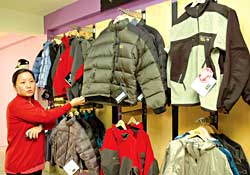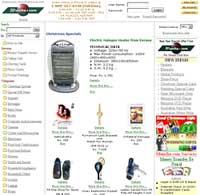 The shopping and retail boom in the capital is hard to miss, even without the holiday season.
The shopping and retail boom in the capital is hard to miss, even without the holiday season.
Department stores and malls offering high-quality consumer products have managed to rope in quite a few locals. This means they are less dependent on Indian shoppers and tourists as they used to be.
All in all, the Kathmandu consumer has become more quality-conscious and have gotten used to the convenience of shopping under one roof. And the supermarket chains and malls are responding to this booming demand.
The latest to hit the markets are branded products. Labels, specialising in international brands has opened up sister outlets like Pepe on New road and Adidas on Durbar Marg. By bringing in their own imports from Europe and India, stocking trips to wholesale markets in Bangkok and Singapore have gone down. Most trade in cheaper clothing and knock-off designer goods has been replaced by the Tibet trade. Bluebird and Namaste, for instance, now have exclusive sections for branded goods owned by Labels.
"Businesses in Nepal have lacked creativity and originality," says Bijen Jhonchhe, owner of Metro Mall, Soaltee Mode. Shop owners are now spending a lot more money on improving the ambience of their stores and providing customers with a hassle-free, convenient shopping experience.
"Nepalis are becoming very brand conscious and prefer buying quality products," says Dikila Lama, co-owner of United Brands, specialising in mountaineering gear and casual wear. United Brands gives shoppers the choice of buying top-notch, authentic brands like Jansport, Low Alpine, Eagle Creek, Ground, etc. "It is necessary for the locals to be exposed to original, genuine products," says Lama. Opened only two months ago in Thamel, the store has found upscale customers not only in tourists but in the local crowd as well.
The market in Nepal is reaching a stage where it could possibly become a free port like Dubai and Singapore. If more store-owners invest in creating a shopper-friendly atmosphere and selling genuine products, the tourism industry should be welcoming this advancement with open arms.
As Kathmandu shoppers become more sophisticated, supermarkets have had to find innovative means of attracting customers. All in all, a good thing for the consumers as not only will they have a one stop shopping experience but also quality products at quality prices.
Dot com shopping
 For all those who want to be able to shop in their pyjamas with a hot mug of coffee, there is always shopping on the net. Muncha.com began as a shopping website in May 2002, currently selling about 7000 products including various electronic and home appliances and food products. Muncha House also offers money transfer services from the US to Nepal and a photo web site that converts digital images of products into a printable format which is attached to every delivery. Initially targeting people outside Nepal, it has recently taken into account locals as well.
For all those who want to be able to shop in their pyjamas with a hot mug of coffee, there is always shopping on the net. Muncha.com began as a shopping website in May 2002, currently selling about 7000 products including various electronic and home appliances and food products. Muncha House also offers money transfer services from the US to Nepal and a photo web site that converts digital images of products into a printable format which is attached to every delivery. Initially targeting people outside Nepal, it has recently taken into account locals as well.
"We have made the web site more user-friendly for the locals," says Amrit Tuladhar, founder of Muncha.com The food and rations section is a recent addition to the web site, where rice, dal and common spices are sold at standard market rates. Muncha also provides free delivery for members and is one of many other online shopping experiences that are emerging for the net savvy Nepali who is too busy to go to the store.
Bluebird
 Starting off as one of the first supermarket chains in 1985, Bluebird set the trend for many others to follow. The competition has proved beneficial and as a result, prices have gone down. A full-fledged departmental store offering a variety of popular food products, local and imported, it also has an audio-video section offering appliances and has recently introduced branded items, sticking to the big brands like Nike, Reebok, Adidas, etc. "We do not sell many Chinese items as we would rather stick to investing in better quality," says Binod Tuladhar. Giving customers a treat to look forward to, Bluebird is giving every shopper who makes a purchase of up to Rs 15,000 a free one night stay (valid for couples) at the Bluebird Hotel in Pokhara.
Starting off as one of the first supermarket chains in 1985, Bluebird set the trend for many others to follow. The competition has proved beneficial and as a result, prices have gone down. A full-fledged departmental store offering a variety of popular food products, local and imported, it also has an audio-video section offering appliances and has recently introduced branded items, sticking to the big brands like Nike, Reebok, Adidas, etc. "We do not sell many Chinese items as we would rather stick to investing in better quality," says Binod Tuladhar. Giving customers a treat to look forward to, Bluebird is giving every shopper who makes a purchase of up to Rs 15,000 a free one night stay (valid for couples) at the Bluebird Hotel in Pokhara.
Gemini  Gemini was established in 1991 and they started out as the biggest grocery store in Kathmandu. Now they have expanded into two departmental stores with one in Boudhha and the other in Jawalakhel. Gemini was the first store to introduce computer billing and barcode scanners in Nepal, according to Jagdish Maskey. "Earlier people liked to go to shops and give the shopkeepers their lists. Now they prefer variety and choosing their own products; this is probably why the retail boom is happening," Maskey says.
Gemini was established in 1991 and they started out as the biggest grocery store in Kathmandu. Now they have expanded into two departmental stores with one in Boudhha and the other in Jawalakhel. Gemini was the first store to introduce computer billing and barcode scanners in Nepal, according to Jagdish Maskey. "Earlier people liked to go to shops and give the shopkeepers their lists. Now they prefer variety and choosing their own products; this is probably why the retail boom is happening," Maskey says.
Though facing some problems due to the traffic situation in Boudha, Maskey maintains that Gemini is booming. "Even with only 20 percent of business capacity we aren't doing badly," he adds.
Saleways  'We will make the difference' is the motto of the new Saleways departmental store which is opening soon in Jawalakhel. Saleways plans to become the Walmart of Nepal and it seems to already be on its way with two stores already open in Pokhara doing booming business. Saleways plans to expand to Kathmandu and beyond. Says Sudhir Pradhanang, "Organised retail is at a very nascent stage in Nepal right now, the potential is huge and we plan to cash in on it." Sushil Pradhanang, Sudhir's brother, adds, "We are different and are planning to provide superior customer service with memberships and paying them back according to their expenses through various free packages and plans".
'We will make the difference' is the motto of the new Saleways departmental store which is opening soon in Jawalakhel. Saleways plans to become the Walmart of Nepal and it seems to already be on its way with two stores already open in Pokhara doing booming business. Saleways plans to expand to Kathmandu and beyond. Says Sudhir Pradhanang, "Organised retail is at a very nascent stage in Nepal right now, the potential is huge and we plan to cash in on it." Sushil Pradhanang, Sudhir's brother, adds, "We are different and are planning to provide superior customer service with memberships and paying them back according to their expenses through various free packages and plans".
Metro Mall  Metro Mall is now two years old, as possibly the first 24-hour department store not just in Nepal but the region. Located inside the Soaltee Complex, security was not a problem and the store catered to the all-night crowd at casinos and was a shopping paradise for the jet-lagged and nightbirds. Though it has a reputation for being more expensive, proprietor Bijen Jhonchhe insists his products are actually up to seven percent cheaper.
Metro Mall is now two years old, as possibly the first 24-hour department store not just in Nepal but the region. Located inside the Soaltee Complex, security was not a problem and the store catered to the all-night crowd at casinos and was a shopping paradise for the jet-lagged and nightbirds. Though it has a reputation for being more expensive, proprietor Bijen Jhonchhe insists his products are actually up to seven percent cheaper.
"In Nepal, if there's a road, there's a shop," explains Jhonchhe stressing the extent of the 'shutter culture' of the mom-and-pop shops. The market is completely laissez faire and the government doesn't have restrictions on the number of shops on a street. "Every shop owner should be made to pay a minimum sum of revenue to the government every month," he says, "That way you encourage both quality and healthy competition."
Namaste  Namaste was one of the first supermarkets in Patan when it opened 12 years ago, now it is one of many. When Jeevan Shakya first opened his store, people used to think that supermarkets were only for the rich. "We have changed that attitude, and now people are becoming more aware of the fact that all sorts of products from all price ranges are available with us," he says. Namaste did so well that it has expanded and moved to the former Hotel Narayani in Pulchok. (Its former premises in Jawalakhel have been taken over by Saleways). Shakya would like to keep his store open till midnight, but cites present security concerns.
Namaste was one of the first supermarkets in Patan when it opened 12 years ago, now it is one of many. When Jeevan Shakya first opened his store, people used to think that supermarkets were only for the rich. "We have changed that attitude, and now people are becoming more aware of the fact that all sorts of products from all price ranges are available with us," he says. Namaste did so well that it has expanded and moved to the former Hotel Narayani in Pulchok. (Its former premises in Jawalakhel have been taken over by Saleways). Shakya would like to keep his store open till midnight, but cites present security concerns.
Namaste also plans to have a wine and cookie tasting with caroling for Christmas Eve. Shakya says, " This is the first time that we are organising such an event within a supermarket".
Dexo  Dexo has seen quite an expansion since 1986, when it specialised only in woollen garments. Now, it has music consumer items and a supermarket offering all grocery items. Located in Thamel, Dexo is always busy with late-night shoppers and the most popular spot being the liquor section which draws a lot of wine-lovers. Piracy has hurt the selling of original soundtracks and albums on cds and audiocassettes, but Dexo's emphasis on quality has gotten loyal customers.
Dexo has seen quite an expansion since 1986, when it specialised only in woollen garments. Now, it has music consumer items and a supermarket offering all grocery items. Located in Thamel, Dexo is always busy with late-night shoppers and the most popular spot being the liquor section which draws a lot of wine-lovers. Piracy has hurt the selling of original soundtracks and albums on cds and audiocassettes, but Dexo's emphasis on quality has gotten loyal customers.


